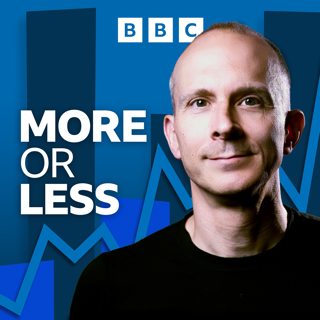
How weird was the Med Sea heatwave?
In early July, the Mediterranean Sea experienced a marine heatwave. The surface of the water reached temperatures of 30 degrees in some places. A social media post at the time claimed that some of these sea temperatures were so different to the normal sea temperature at this time of year, that the sea was experiencing a “1-in-216,000,000,000-year sea temperature anomaly”. This would suggest that the likelihood of the event was on a timescale far longer than the amount of time the entire universe has existed. Is the claim true? Dr Jules Kajtar, a physical oceanographer from the National Oceanography Centre, takes a look at the statistics. We heard about this story because a listener spotted it and emailed the team. Get in touch if you’ve seen a number you think we should look at. moreorless@bbc.co.ukPresenter: Lizzy McNeill Series producer: Tom Colls Production co-ordinator: Rosie Strawbridge Sound mix: Neil Churchill Editor: Richard Vadon
16 Elo 8min

Why it matters that Trump fired data chief
On Friday 1st August the US Bureau of Labor Statistics put out their job report data for August. It included revisions to their estimates for the jobs created in May and June which stated there were 258,000 fewer jobs than they had previously estimated. This news was not received well by the White House. President Trump fired the head of the bureau, Erika McEntarfer, calling the numbers ‘phony, rigged, a scam’ and spreading conspiracy theories that McEntarfer had fudged the data. We speak to economist Michael Strain from the American Enterprise Institute, to understand why the revisions happened and the potential consequences of throwing doubt on one of the US’s most important statistical agencies. If you’ve seen a number in the news you think we should take a look at, email the team: moreorless@bbc.co.ukPresenter: Lizzy McNeill Producer: Lizzy McNeill Series Producer: Tom Colls Production Co-ordinator: Rosie Strawbridge Sound mix: Neil Churchill Editor: Sam Bonham
9 Elo 8min

Are abortion numbers rising in the US?
In June 2022 the United States Supreme Court passed what became known as ‘the Dobbs decision’. In doing so they overturned the long standing constitutional right for women to access abortion in the US. Since then a number of states have banned abortion completely with many others having highly prohibitive rules. You’d expect the numbers of abortions to go down. They haven’t. How is it possible that more people are accessing abortions in a post Dobbs society and why is it not true that states which have total bans have zero abortions per year? Presenter: Lizzy McNeill Producer: Lizzy McNeill Series Producer: Tom Colls Production Co-ordinator: Rosie Strawbridge Studio Manager: Neil Churchill Editor: Richard Vadon, Bridget Harney.
6 Elo 8min

Does a single AI query use a bottle of water?
We’re living through boom-times for Artificial Intelligence, with more and more of us using AI assistants like ChatGPT, DeepSeek, Grok and Copilot to do basic research and writing tasks. But what is the environmental impact of these technologies? Many listeners have got in touch with More or Less to ask us to investigate various claims about the energy and water use of AI.One claim in particular has caught your attention - the idea that the equivalent of a small bottle of drinking water is consumed by computer processors every time you ask an AI a question, or get it to write a simple email. So, where does that claim come from, and is it true?Reporter: Paul Connolly Producer: Tom Colls Production co-ordinator: Brenda Brown Sound mix: Donald McDonald Editor: Richard Vadon
6 Elo 8min

Are one in six children living through war?
In the midst of the television coverage of Soccer Aid, a celebrity soccer match organised by Unicef, the audience was told that “one in six children around the world are currently living through war”. Listener Isla got in touch with More or Less to ask whether the claim was correct, so we tracked down the source to an organisation called the Peace Research Institute Oslo.Research director Siri Aas Rustad tells us how they worked out a figure for the number of children living near to a “conflict” and the big differences between that and something most people would think of as “war”.If you’ve seen a number you think we should look at, email the team on moreorless@bbc.co.ukPresenter: Lizzy McNeill Producer: Nicholas Barrett Series producer: Tom Colls Production co-ordinator: Brenda Brown Sound mix: Giles Aspen Editor: Richard Vadon
19 Heinä 8min

Why Manchester United can afford to play badly
Manchester United are terrible, even according to their own manager. Last season saw their worst ever performance in Premier League history.But at the same time, according to Forbes magazine, they’re still the second most valuable football club in the world. How is that possible?Tim talks to Kieran Maguire, a football finance expert and the author of The Price of Football, to find out the secret of Manchester United’s financial success. Presenter: Tim Harford Producer: Nicholas Barrett Series producer: Tom Colls Production co-ordinator: Brenda Brown Sound mix: Neil Churchill Editor: Richard Vadon
12 Heinä 8min

Can drinking one less bottle of coke a day halve obesity?
Tim Harford investigates some of the numbers in the news and in life. This week:Is the secret to halving obesity rates really just a matter of cutting back on one fizzy drink a day?How many new babies in the City of London have a foreign-born parent? And since fewer than one baby a week is actually born in the City of London, how much should we care?Electricity in the UK is more expensive than almost anywhere else. Why? And is it anything to do with wind turbines?And we help out rival Radio 4 programme Start the Week with a claim about churches.If you’ve seen a number in the news you think we should take a look at, email the team: moreorless@bbc.co.ukMore or Less is produced in partnership with the Open University.Presenter: Tim Harford Reporter: Lizzy McNeill Producer: Nicholas Barrett and Nathan Gower Series producer: Tom Colls Production co-ordinator: Brenda Brown Sound Mix: James Beard Editor: Richard VadonShow less
9 Heinä 26min

The economics of war: Vikings, Conquistadors and Vietnam
How does economics help us understand conflicts through history? That’s the question that economist and journalist Duncan Weldon tries to answer in his new book, Blood and Treasure. Tim talks to Duncan about the economic perspective on Viking raiders, Spanish conquest and the Vietnam war.Presenter: Tim Harford Producer: Tom Colls Production co-ordinator: Brenda Brown Sound mix: Neil Churchill Editor: Richard Vadon
5 Heinä 8min





















